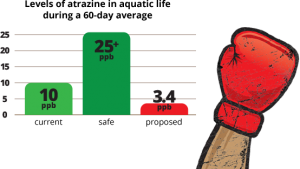Atrazine is once again under attack with a recent report from the U.S. Environmental Protection Agency (EPA) highly critical of the ag herbicide. National Corn Growers Association (NCGA) has been fighting for the right of growers to use atrazine and to learn more I spoke with Kevin Skunes, the first vice president elect for NCGA and a farmer from Eastern North Dakota, during the 2016 Farm Progress Show. He says the state’s corn crop is really good and the soybeans look good as well.
 Back in June of this year, EPA released its draft ecological risk assessment for atrazine as part of the herbicide’s re-registration process. Skunes says that if the assessment stands, then atrazine will effectively be banned from use. This is a big negative for the ag industry, because, says Skunes, the herbicide plays an important role in conservation cropping systems that help reduce soil erosion.
Back in June of this year, EPA released its draft ecological risk assessment for atrazine as part of the herbicide’s re-registration process. Skunes says that if the assessment stands, then atrazine will effectively be banned from use. This is a big negative for the ag industry, because, says Skunes, the herbicide plays an important role in conservation cropping systems that help reduce soil erosion.
In addition, says Skunes, there are no other herbicides that do what atrazine does in relation to combating weed resistance. Regarding EPA’s recommendation to limit the use of atrazine, Skunes, says, “It’s just a horrible decision on their part in my opinion because they are not basing their decision on sound science. There are over 7,000 studies out there that show atrazine is safe as an effective crop protection tool.” He noted that even the World Health Organization has studies showing atrazine is safe.
Bob Hartzler, professor of weed science at Iowa State University, notes that atrazine has allowed better soil conservation programs for growers, especially no-till and conservation tilling. Prior to atrazine, he says, tillage was the primary mechanism for weed control – weeds that waste water and nutrients.
 “Atrazine isn’t the only tool used today, but it has a unique chemistry that makes other chemicals work better,” says Hartzler. “That synergy is documented, and the benefit is it allows farmers to manage weeds effectively, especially problem weeds, and it allows reduced use of these other chemicals.”
“Atrazine isn’t the only tool used today, but it has a unique chemistry that makes other chemicals work better,” says Hartzler. “That synergy is documented, and the benefit is it allows farmers to manage weeds effectively, especially problem weeds, and it allows reduced use of these other chemicals.”
Skunes is calling on growers across the country to fight for atrazine. The EPA comment period goes until October 4, 2016. He says if a grower would like help voicing his or her concerns, he or she can go to www.ncga.com/atz to submit comments directly to the EPA or one can sign a petition at FightEPA.com.
Learn more about EPA’s atrazine assessment by listening to my interview with Kevin Skunes: Interview with Kevin Skunes, NCGA




